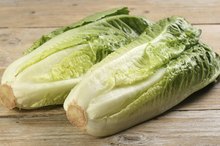Carrots and Digestion
When you were a child, your mother might have told you that carrots are a healthy food -- she was right. Packed with vitamins, minerals and dietary fiber, carrots make a perfect low-calorie snack, add color and flavor to salads and are a good side dish at dinner. Among their many benefits, carrots are good for your digestion, helping to keep your digestive organs working well and lowering your risk of intestinal and other problems.
Fiber Content
Carrots are rich in dietary fiber, a type of indigestible carbohydrate that's found in plant-based foods. Fiber comes in two forms, called soluble and insoluble, and carrots are a good source of both types. For example, a 1-cup serving of sliced, cooked carrots provides a total of about 3.5 grams of fiber, with approximately equal amounts of each type. Although it provides no nutrients, fiber plays an important role in digestive health. Healthy adults need between 20 and 30 grams of fiber daily for good health.
- Carrots are rich in dietary fiber, a type of indigestible carbohydrate that's found in plant-based foods.
- Fiber comes in two forms, called soluble and insoluble, and carrots are a good source of both types.
Fiber Benefits
How Many Calories in Carrot Sticks?
Learn More
The insoluble fiber in carrots helps move food through your digestive tract smoothly, adding bulk to your stool and helping prevent constipation. Insoluble fiber can also lower your risk of some digestive disorders. For example, experts at the Harvard School of Public Health say that a diet high in insoluble fiber could reduce your risk of an inflammatory disease of the intestine called diverticulitis by about 40 percent 1. Unlike insoluble fiber, soluble fiber in carrots forms a gel when it mixes with liquid in your stomach. It slows the digestive process, helping blood sugar and cholesterol rise slowly and gradually after a meal. This could lower your risk of type-2 diabetes and heart disease, according to information from Harvard.
- The insoluble fiber in carrots helps move food through your digestive tract smoothly, adding bulk to your stool and helping prevent constipation.
- For example, experts at the Harvard School of Public Health say that a diet high in insoluble fiber could reduce your risk of an inflammatory disease of the intestine called diverticulitis by about 40 percent 1.
Vitamin A
Carrots are especially rich in beta-carotene, a precursor of vitamin A, or retinol. Your body converts beta-carotene into active vitamin as it needs it. A 1-cup serving of raw, chopped carrots provides enough beta-carotene to produce slightly over 1,000 retinol activity units, which is slightly above the daily amount required for an adult male. Vitamin A is sometimes called the anti-infective vitamin because it boosts your immune system, supporting formation of immune cells called lymphocytes. These cells are found in tissues of the digestive tract and help fight off pathogens you might ingest with food. Vitamin A is also essential for maintenance of the lining of the digestive tract, which is the first line of defense between food-borne pathogens and the rest of your body.
- Carrots are especially rich in beta-carotene, a precursor of vitamin A, or retinol.
- Vitamin A is also essential for maintenance of the lining of the digestive tract, which is the first line of defense between food-borne pathogens and the rest of your body.
Mineral Survey
Nutritional Value of Carrots and Celery
Learn More
Carrots are also a good source of several essential minerals, including calcium and potassium, with a 1-cup serving of raw, chopped carrots providing about 40 milligrams of calcium and 400 milligrams of potassium. Both minerals are required for normal contraction of all types of muscle, including smooth or involuntary muscle, which is found in the wall of your stomach, intestines and colon. After you eat, rhythmic contractions of this muscle layer help move food through the digestive tract, so taking in sufficient quantities of these minerals is essential for good digestion. If you have questions about the potential benefits of carrots, talk to your doctor or to a registered dietitian.
- Carrots are also a good source of several essential minerals, including calcium and potassium, with a 1-cup serving of raw, chopped carrots providing about 40 milligrams of calcium and 400 milligrams of potassium.
- If you have questions about the potential benefits of carrots, talk to your doctor or to a registered dietitian.
Related Articles
References
- Harvard School of Public Health: Fiber
- Linus Pauling Institute: Vitamin A
- Office of Dietary Supplements: Vitamin A
- Carrots, raw. FoodData Central. U.S. Department of Agriculture. Published April 1, 2019.
- Glycemic index for 60+ foods. Harvard Health Publishing, Harvard Medical School. Updated 2020.
- Ahmad T, Cawood M, Iqbal Q, et al. Phytochemicals in and their health benefits-review article. Foods. 2019;8(9). doi:10.3390/foods8090424
- Potassium. Fact Sheet for Health Professionals. National Institutes of Health Office of Dietary Guidelines. Updated June 3, 2020
- Vitamin A: Fact Sheets for Health Professionals. National Institutes of Health, Office of Dietary Supplements. Updated 2020.
- Ishimiya M, Nakamura H, Kobayashi Y, et al. Tooth loss-related dietary patterns and cognitive impairment in an elderly Japanese population: The Nakajima study. PLoS ONE. 2018;13(3):e0194504. doi:10.1371/journal.pone.0194504
- Oral allergy syndrome (OAS) or pollen fruit syndrome (PFS). American Academy of Allergy, Asthma & Immunology.
- Al Nasser Y, Albugeaey M. Carotenemia. StatPearls. Treasure Island (FL): StatPearls Publishing; 2020.
- Carrot. University of Illinois Extension, Watch Your Garden Grow. Updated 2020.
Writer Bio
Joanne Marie began writing professionally in 1981. Her work has appeared in health, medical and scientific publications such as Endocrinology and Journal of Cell Biology. She has also published in hobbyist offerings such as The Hobstarand The Bagpiper. Marie is a certified master gardener and has a Ph.D. in anatomy from Temple University School of Medicine.








